
The slippery dick is a species of wrasse native to shallow, tropical waters of the western Atlantic Ocean.

The checkerboard wrasse is a fish belonging to the wrasse family. It is native to the area including the Indian Ocean to central Pacific Ocean.

Halichoeres, commonly called wrasses, are a genus of fish in the family Labridae found in the Atlantic, Indian and Pacific Oceans.
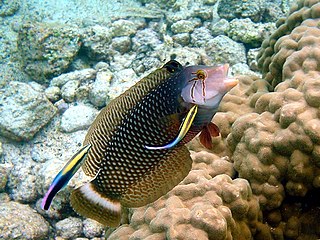
Novaculichthys taeniourus, also known as the rockmover wrasse, carpet wrasse, dragon wrasse, bar-cheeked wrasse, olive-scribbled wrasse or reindeer wrasse, is a species of wrasse mainly found in coral reefs and lagoons in the Indo-Pacific region. These include habitats in the Gulf of California to Panama; tropical Pacific Ocean islands including Hawaii; the Philippines, Indonesia and Australia; and the Indian Ocean to the east coast of Africa. The common name, "rockmover wrasse", comes from their behavior of upending small stones and reef fragments in search of prey. This species is the only known member of its genus.

The bird wrasse, Gomphosus varius, is a species of the wrasse family.
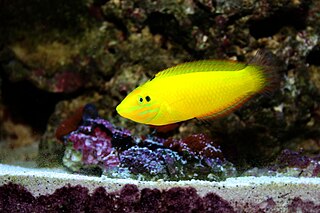
Halichoeres chrysus, commonly called the canary wrasse, golden wrasse or yellow wrasse, is a fish species in the wrasse family native to central Indo-Pacific area.
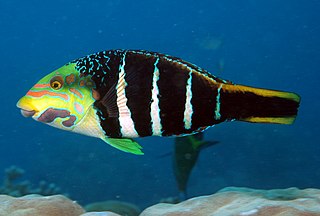
The barred thicklip wrasse, Hemigymnus fasciatus, is a species of fish belonging to the wrasse family, native from the Indo-Pacific.
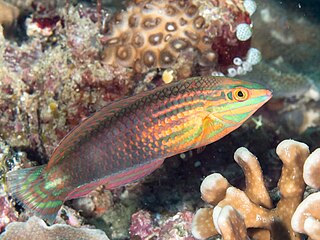
The red-lined wrasse, two-spotted wrasse or biocellated wrasse, Halichoeres biocellatus, is a species of wrasse native to shallow tropical waters in the western Pacific Ocean.

The chiseltooth wrasse is a species of marine ray-finned fish, a wrasse from the family Labridae. It is native to the Indian Ocean and the western Pacific Ocean. It is an inhabitant of coral reefs and can be found at depths from 3 to 60 m, though rarely deeper than 40 m (130 ft). This species grows to 30 cm (12 in) in total length. It is of minor importance to local commercial fisheries and can be found in the aquarium trade. P. moluccanus is the only known member of its genus.
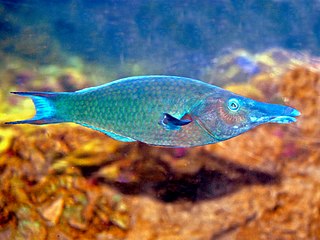
Gomphosus caeruleus, the green birdmouth wrasse, is a species of wrasse belonging to the family Labridae. It can be found in the aquarium trade.

Halichoeres leucoxanthus, commonly called the Canarytop wrasse, Whitebelly wrasse, or Lemon meringue wrasse, is a fish species in the wrasse family endemic to the Indian Ocean.
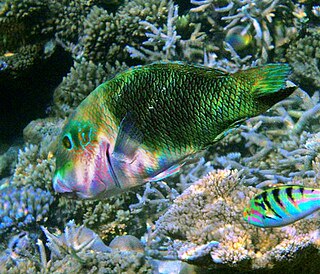
The Blackeye thicklip wrasse or Half-and-half wrasse is a species of fish belonging to the wrasse family. It is native to the Indo-Pacific.
Halichoeres richmondi, commonly called the Richmond's wrasse or chain-lined wrasse, is a fish species in the wrasse family native from the central Indo-Pacific.

Halichoeres scapularis, commonly called the Zigzag wrasse , is a fish species in the wrasse family native from the Indo-West Pacific.
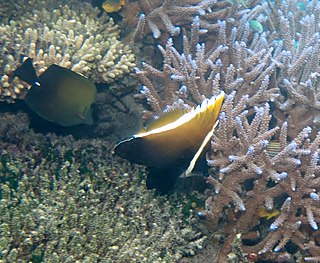
Heniochus varius, the horned bannerfish or humphead bannerfish, is a species of marine ray-finned fish, a butterflyfish belonging to the family Chaetodontidae, native from the central Indo-Pacific area.

Siganus virgatus is a species of marine fish of the family Siganidae, order Perciformes, suborder Acanthuroidei.

The blackear wrasse is a species of wrasse, a type of fish in the family Labridae, from the warmer waters of the western Atlantic Ocean.

Latent sling-jaw wrasse is a species of ray-finned fish from the wrasse Family Labridae which is associated with reefs in the south-western Pacific Ocean.

The bleeding wrasse is a species of marine ray-finned fish from the family Labridae, the wrasses. It is found in reefs in the eastern central Pacific Ocean.

Pseudocoris heteroptera, the torpedo wrasse or zebra wrasse, is a species of marine ray-finned fish, a wrasse from the family Labridae. It is found in the western Pacific Ocean where it is associated with reefs.





















